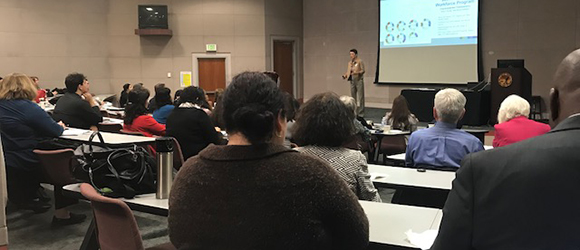
(Photo: Ed Coghlan/CAFwd)
California’s distinct regional economies demand a versatile and diverse workforce. That necessity helped attract over 100 people to the Southeast Los Angeles Future of Work MeetUp at Cerritos College in Norwalk.
The focus of the meeting: how we can improve the work skills of up to nearly nine million Californians who don’t have a college degree and may be at risk to be left behind in a fast moving and changing California economy.
These are California's potentially “stranded workers.”
For the Executive Vice Chancellor for Workforce and Digital Futures at the California Community Colleges, Van Ton-Quinlivan, it’s an imperative these California workers—about half of whom are in Spanish speaking households—find a convenient and effective way to improve their skills.
To open up access to working Californians interested in improving their skills, the Colleges are proposing to create a new statewide online-only community college.
“It can be a more accessible and affordable solution for adult worker learners that they can attend while balancing work and family obligations,” Ton-Quinlivan said.
 Ton-Quinlivan listened to the audience—the majority of whom were educators—outline concerns about reaching Spanish speaking households, educating stranded workers whose technological skills might be limited and picking faculty members and mentors who can help adult learners navigate the new online college.
Ton-Quinlivan listened to the audience—the majority of whom were educators—outline concerns about reaching Spanish speaking households, educating stranded workers whose technological skills might be limited and picking faculty members and mentors who can help adult learners navigate the new online college.
It’s part of why these meetups are being scheduled across California—to give regional leaders a voice in developing the state’s first online college. Employers also made their voices heard.
Rodney Davis of SoCal Gas told the audience that the current and the future workforces demand a different kind of skilled worker—one who is much more technologically savvy and better prepared.
Emilio Sosa is on the Board of the Lakewood Chamber of Commerce and is executive director of the Long Beach YMCA.
“I liked the presentation today but we need more employers in the conversation,” Sosa said. “The colleges need to hear from them in order to prepare the right type of certificate programs and curriculum to help our regional workforce.”
Even the state’s new and emerging cannabis industry had a point of view. Edgar Aranda represents the Lynwood Cannabis Association.
“The city of Lynwood demands local people are hired for the manufacturing and cultivation operation and management duties that are needed for our new industry,” Aranda said. “Workers in our city need to be trained.”
The Southeast Los Angeles Workforce Development Board and Cerritos College hosted Monday’s meeting. The audience explored artificial intelligence, the rise of gig economy platforms, and a new wave of automation and the impact on workers, employers and policy makers.
How will these changes impact the future of work and the skill sets required to thrive in the workforce?
Obviously, there is a great fear in the workforce that automation is going to force people out of work. In fact, in a survey taken at the meeting, over 90 percent of respondents said automation will disrupt the workforce in Southeast Los Angeles County in the next decade.
The statistics indicate that automation is not necessarily eliminating jobs as much as it is changing them. It’s estimated that 60 percent of all occupations could see 30 percent of their duties automated.
One of the new jobs automation has created is fixing the robots.
The Business Service Manager for the San Bernardino County Workforce Development Board shared an experience he had at a local health care facility.
“There was a robot who patrolled the parking structure in the role of a security guard,” he said. “I saw a couple of people repairing the robot—doing jobs that no doubt pay better than the security guard the robot apparently replaced.”
The answer to being ready for the future lies in how we address the middle skills gap in our economy.
The meetups will continue across California for the next couple of months as our distinct economic regions speak up about what they will need in order to make sure their workforce preparation is aligned with the needs of their regional employers.
For more information and to find a MeetUp happening near you, visit the Future of Work MeetUp page.

